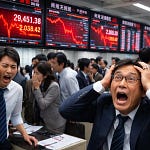The vast majority of fund management theory rarely survives contact with market reality. Back testing various theories would have told you to sell the American market years ago, and here we are today, pushing new highs. Fund managers, facing performance and career pressure will almost always become index huggers of some sort, and then work out various justifications after the fact. For this reason, passive investment works, and tends to beat active managers. In a trending market, just blindly sitting there holding the index makes total sense.
In my case, I develop theories, and apply them until the market tell me otherwise. With Brumby Capital, I am currently applying two theories that I have developed myself over my career. The first is a practical one, that allows me to run net short until a bear market happens (if they still happen), and the second one is a macro theory, that should generate a bear market. As it happens, the first theory which is centred around the idea of a “correlation break” is working well, so I am pleased with that. The second one, build around the idea of rising cost of capital, is sending conflicting messages - but I think that is creating an opportunity, rather than telling me wrong. If these conflicting messages resolve itself in a lower cost of capital, then I am wrong, and I move on (to the beach and golf course). If these conflicting messages resolve itself in a higher cost of capital, then I am right, and I make good money. Currently, I am sitting in no man’s land.











